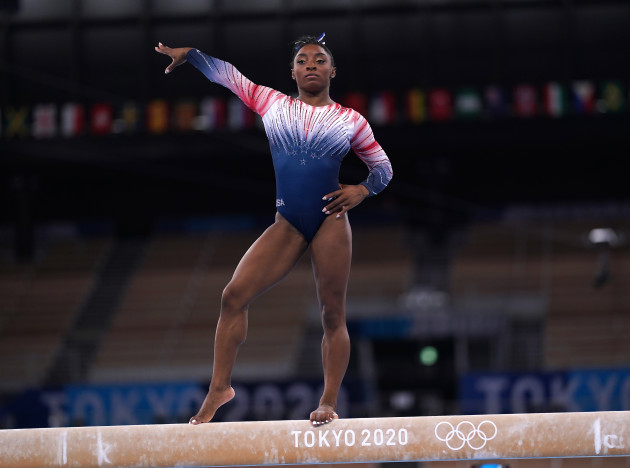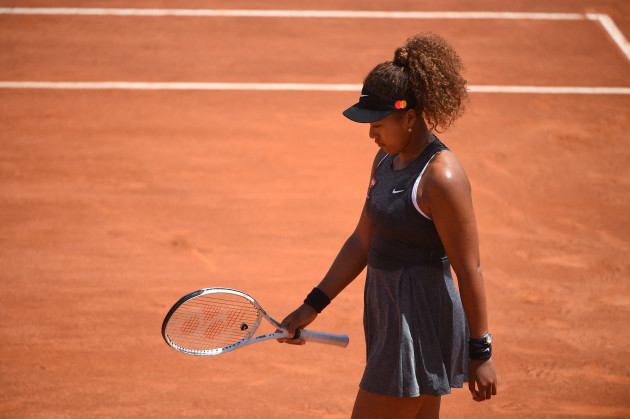A HIGHLY REGARDED Irish sports psychologist has applauded athletes Simone Biles and Naomi Osaka for the bravery they have shown to prioritise their mental health ahead of their sport.
Enda McNulty, the CEO of McNulty Performance and 2002 All-Ireland winner with the Armagh footballers, says that both athletes have demonstrated that “it’s ok not to be ok in public.”
US gymnast Biles decided to withdraw from three of the four individual finals at the Tokyo Olympics due to concerns with her mental health. She also cited her struggles with a spatial awareness issue in her sport known as “twisties.” This condition interferes with a gymnast’s ability to orientate themselves in mid-air.
Today, she returned to competition at the Games and captured her seventh Olympic medal when she claimed bronze in the women’s beam.
Earlier this year, tennis star Osaka withdrew from the French Open after suffering from major criticism over her decision to abstain from media duties at the tournament.
She explained at the time that pulling out was the best thing for “my well-being.”
“I think Simone Biles and Naomi Osaka have very strongly outlined the fact that it’s ok not to be ok,” McNulty says to The42 in the days before Biles’ incredible return to clinch that bronze medal.
“And has championed that for men, for girls, for boys all over the world in all sports. It’s exceptionally positive in that regard.
“I think their bravery, I think their courage and the way they articulated their challenges has been graceful, I think it’s been humble and I think it’s been shining the light for everybody in the world – in the normal population or with professional athletes – that it’s ok not to be ok.
“Having spent thousands of hours coaching athletes, working with athletes, what I know for sure is that many athletes will go through a week, a month, maybe even couple of months where they’re really struggling mentally and emotionally.
“It’s made it a little bit more prevalent in the public eye. I don’t think it’s the first time or an outlier, I do think it’s the first time that very high profile athletes at the highest level of their sports are making it not only ok to be not ok, but ok not to be ok in public. And I think that’s an outlier and a huge victory for everyone going through mental health challenges and issues.
“If I could add to that comment that it’s ok not to be ok, I would say it’s not ok not to be supportive or caring.”
McNulty’s company also has a division which is dedicated to the area of global corporate operations and has been contacted by sports organisations about providing mental health assistance for its athletes.
“20 years ago,” says McNulty — who has worked with some of Ireland’s finest athletes throughout his career — “I was working with professional athletes who were taking time out to deal with mental health issues.
“I’m talking about the highest level of world sport. So, I’m not in any way surprised that this has happened. What I am hugely excited about is that now it’s being spoken about in such a graceful, measured and mature approach.
“I think that is new, I think that is enlightening and it does allow people who are struggling to hold up their hand and say, ‘I need help, I can’t go on this weekend but maybe in three weeks when I feel more comfortable again and get a little bit more control of my mental and emotional state.’
“Whether it’s gymnastics, a game of camogie or someone at work who says they need three days off to address their emotional and mental health.”
Going forward, McNulty says that the actions of both Biles and Osaka could lead to a major shift in how mental health is treated in sport, particularly with younger athletes.
“There’s an opportunity here in the public, the mothers and fathers of young athletes and coaches of young athletes. Maybe even the athletes themselves, to educate themselves on how to be proactive with their mental health. That’s the real issue.
“We need to be more proactive with people’s mental health, we need to be more aware of how to deal with a big issue. I would rather have young athletes be proactive for four years to make their mental health stronger and make them more resilient so they can deal with any challenge that lies ahead.”
The42 is on Instagram! Tap the button below on your phone to follow us!


